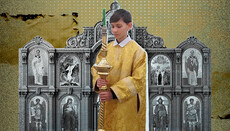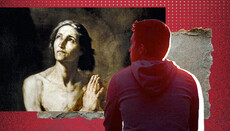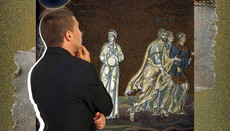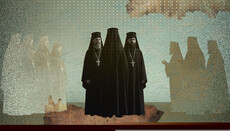On anathema in general and against Cherkasy mayor in particular
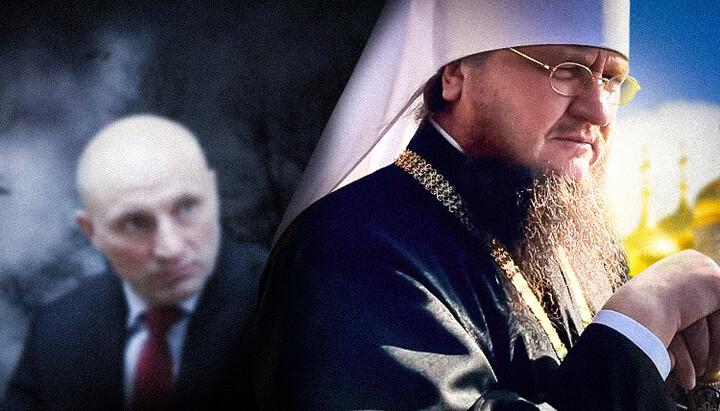
Metropolitan Theodosiy of Cherkasy proclaimed the excommunication of the mayor of Cherkasy from the Church. Apparently, this is not the last such case. What is anathema?
Metropolitan Theodosiy of Cherkasy and Kaniv recorded a video in which he spoke about the seizure of the Cathedral of Cherkassy on 17 October 2024 and anathematised one of the main actors of this seizure, the mayor of Cherkasy Anatoliy Bondarenko. “I have to state that by your actions today you have excommunicated yourself from the Church. As a bishop of Cherkasy I state – you are excommunicated from the Church. This is a great tragedy... I hope you will live a long life, and you will still have the opportunity to correct the tragic mistakes that you have made,” said Metropolitan Theodosiy.
Before saying what is the Church anathema and what is its meaning, let us say what anathema is not. Anathema is not a curse with wishes of all kinds of evil to a person. Anathema is not intended to offend or humiliate a person, to cause him any trouble. On the contrary, anathema is something that should serve for the benefit of the anathematised person, but this is discussed below.
The word anathema (Greek ἀνάθεμα) is translated as excommunication or banishment. It can be used in a broad and narrow sense. Every sin excommunicates a person from God and consequently from the Church. For example, in the Sacrament of Confession there is a prayer which contains the following words: “...forgiving him every sin, whether voluntary or involuntary. Reconcile and unite him to Your holy Church, O Christ Jesus our Lord.” That is, before a person confesses his sins, he is excommunicated from the Church, and only after repentance he is reunited with her. Apostle Paul wrote to the Corinthians: “Whoever does not love the Lord Jesus Christ is anathema, maranatha” (1 Corinthians 16:22). That is, even dislike for Christ makes a person excommunicated from the Church. Here, of course, we can exclaim together with the apostles: “So who can be saved?” (Matthew 19, 25). But the answer is already known: “It is impossible for men, but to God all things are possible” (Matthew 19, 26). Yes, “we all sin much” (James 3:2). But God in His mercy keeps us in the Church, makes us able to participate in the Sacraments, to receive the Holy Mysteries of Christ. This should not throw us into despair but should humble us, help us realise our sinfulness and turn to God in repentance, hoping for His mercy.
In the narrow sense, anathema is proclaimed on behalf of the Church either by a council of bishops or by a bishop alone. In this sense anathema has the following features.
Firstly, anathema is proclaimed for significant sins that concern not only the sinner but also other people. Typically, these involve various heresies and blatant misbelief in doctrinal matters. The sins that can harm the entire Church if they are not promptly cut off from it are included. It can also involve open hostile actions against the Church, as in the case of the mayor of Cherkasy, A. Bondarenko.
Secondly, anathema is a preventive measure aimed at protecting the faithful members of the Church from being contaminated by alien teachings or from the temptation of resonant actions. A classic example is the anathema of Arius and his teaching on the created nature of the Son of God. If the holy fathers of the First Ecumenical Council in Nicaea (325 AD) had not anathematized this teaching, the entire Church might have gone down a path of perdition. Since this teaching rejected the divinity of Jesus Christ, it essentially rejected the salvation of humanity, as only the sacrificial death of the Son of God has the power to save people from curse and death. Anathema serves as a warning to all: do not walk such a path, do not share heretical beliefs, do not follow examples of actions directed against the Church. Otherwise, you will all find yourselves outside the Body of Christ!
Thirdly, anathema is also directed at the person being anathematized. It is a very strong and unequivocal warning that they are outside the Church, outside the ark of salvation. They are on the path to destruction; and if they continue on it, their fate in eternity is bleak. Anathema is a call to repentance and return to the Church. In this sense, anathema is an expression of love for the person, albeit expressed in harsh forms.
Fourthly, in essence, anathema is not imposed on a person; it does not make someone alien to the Church. It merely states the fact that the person, through their own actions and stubborn unwillingness to listen to the voice of the Church, has placed themselves outside of it. In other words, a person is excommunicated from the Church not because a particular bishop or council has declared anathema on them, but because of their own actions and deeds.
Fifthly, anathema is possible only in relation to a member of the Church. It is impossible to excommunicate someone who is not already a member of the Church. The question of belonging to the Church is sometimes very ambiguous. Formally, everyone who has undergone the rite of baptism belongs to the Church. But since almost all or the overwhelming majority of the inhabitants of Ukraine have undergone this rite and for many of them it remained a rite, it is not quite right to call them all members of the Body of Christ. But at least the members of the Church are those who clearly, openly and repeatedly declared it. The mayor of Cherkassy A. Bondarenko is one of them. That is why Metropolitan Theodosiy did not proclaim excommunication from the Church to the other participants of the bloody seizure of St Michael's Cathedral. They initially did not position themselves as members of the UOC, did not participate in the divine services and did not receive the Sacraments.
Sixthly, a person can always return to the Church by repenting for those sins for which he was anathematised. No one will turn away from such a person, no one will close the door of the Church in front of him. On the contrary, probably no one wants the conversion of a sinner as much as the bishop who stated his excommunication from the Church.
Metropolitan Theodosiy in his address foresaw that the leadership of the OCU would not fail to declare A. Bondarenko's anathema null and void. We will say from ourselves that it will also give him awards from its religious organisation for the attack on the cathedral. But the anathema has no significance today either in the legal field or in the sphere of social relations. It has only a sacral meaning. It does not matter how a person looks in front of people like him. What matters is what a person appears in the eyes of God. And how can a person look in the eyes of God, who previously participated in services at St. Michael's Cathedral, who went for blessing to the Primate of the UOC, His Beatitude Onuphry, who received the sacraments from the hands of Metropolitan Theodosiy and then called for what happened on 17 October 2024: a bloodbath, beating Metropolitan Theodosiy, the clergy and believers, the seizure of the shrine, robbery and lawlessness? And here we are not even talking about the subject of jurisdictions where the supporters of the OCU like to turn. In itself the beating and seizure of St Michael's Cathedral is such a clear lawlessness, such a blatant violation of the commandments of God, such a clear abuse of the holy shrine that there is no doubt that all this is against the Church of Christ. It would be interesting to send an official request to the Patriarchate of Constantinople: whether the Phanar recognises the anathema proclaimed by Metropolitan Theodosiy or not. Let him watch the video of 17 October and answer! All the more so because the Phanar has not been delighted for a long time with all the violence and iniquities committed by the OCU.
Speaking of anathemas, it is impossible not to mention that in the history of the Church, church leaders have often, and even too often, abused anathemas, proclaiming them not for crimes against the Church, but for political reasons. Many Christian Churches in both East and West have resorted to these abuses. Often hierarchs and even councils proclaimed anathema for rebellion against the sovereign and violation of the corresponding oath of allegiance. But unfortunately, this only applied to unsuccessful rebels. If the rebellion was suppressed, the rebels were anathematised, as, for example, the Decembrists after their attempted coup d'état in St Petersburg in 1825. But if the conspiracy was successful, they continued to be regarded as good Christians and received the Sacraments “without any hesitation”. For example, the coup d'état in St. Petersburg in 1801, during which the conspirators killed Emperor Paul I, to whom they had sworn allegiance a few years earlier, with a snuff box. And Paul's son, Emperor Alexander I, who at least knew of the plot and gave his tacit consent to it, not only was not excommunicated from the Church but ruled Russia for nearly a quarter of a century. In the history of the Orthodox Byzantine Empire such situations occurred regularly.
For Ukraine, the most famous political anathema is the anathema to Hetman Mazepa for betraying the Russian Emperor Peter I and siding with the Swedish King Charles in 1708. We will not now consider the question of whether this anathema has religious grounds or not, we will only say that Peter I himself, among other things, founded in the early 1690's “The All-Joking, All-Drunken Synod of Fools and Jesters”, which existed for almost 30 years and was an abominable sacrilegious and, most importantly, popular parody of church rites. The Tsar and his cronies worshipped Bacchus, organised (often in Lent) parody anti-church processions, indulged in drunkenness and debauchery. Historical documents describing all these abominations have been preserved, which are inconvenient even to quote. And for all this Peter I was not only not anathematised but was called “the most Christian sovereign”.
However, all these numerous abuses do not change the very essence of anathema. The Lord gave his apostles and their successor bishops the authority to bind and to resolve. “Verily I say unto you, Whatsoever ye bind on earth shall be bound in heaven; and whatsoever ye loose on earth shall be loosed in heaven” (Matthew 18:18). The fact that there are cases of abuse of this authority in Church history does not invalidate the very words of Christ. In this case, the mayor of Cherkasy A. Bondarenko openly opposed the Church. His position had bloody consequences. One cannot act in this way and remain a member of Christ's Church. One cannot be a persecutor of the Christian community and be considered a Christian at the same time. Here we have to choose one of the two. And A. Bondarenko made his choice, he declared himself as an opponent of the Church. And Metropolitan Theodosiy only stated this fact. Vladyka Theodosiy is a graced bishop, who has a succession of ordinations from the Apostles of Christ. He is not under any ecclesiastical prohibitions or restrictions; he is the ruling bishop of the Cherkasy Eparchy. He is precisely the man who has the power to bind and decide.
And in this case, the anathema he proclaimed to the Cherkasy mayor is not an abuse. It is not dictated by political considerations, it is not connected with the struggle for power, it is not caused by personal offence or something similar. It is an evaluation of the mayor's actions against the Church. This anathema is intended to bring to A. Bondarenko's attention the fact that by these actions he has put himself outside the Church. And there let him think as he wants, if he can lull his conscience with incantations that Serhiy Dumenko (Epifaniy) will lift this anathema from him, he will probably be able to sleep well. If he looks at things soberly, he will be horrified at the prospect of being at the Last Judgement of God with the stigma of being excommunicated from the Church. And if he still has some remnants of Christian conscience, it will tell him: anathema is a serious matter, such things are not a joke.
Therefore, let us wish the former servant of God Anatoliy to repent before God and return to His holy Church, for only in this way and no other way do all those who have been excommunicated from it return.
